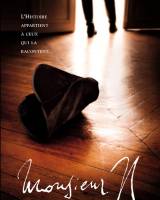|
Monsieur N.
Interview
Taken from the press kit, February 2003

RENÉ MANZOR, Screenwriter
How do you work on a historic thriller with Napoleon as its hero ?
R.M. : As with every screenplay, before the writing proper, there were several months of research. For Monsieur N, it was my wife, Marie, who carried out this work for me. She read everything that has been written about the period. And I would never have been able to write the screenplay without her precious help. She gave me what the historians call "the Scriptures" to read, in other words the memoirs of Las Cases, Gourgaud, Bertrand and Montholon. The main thing that interested me about these accounts were the contradictions that they are filled with. I compared these historical accounts with the reports made by the English Governor, Hudson Lowe, reports that can be consulted in the British Library in London. I found other contradictions there. I built my story up on those contradictions. I let my imagination run free to answer the questions that History doesn’t answer. Notably the one that Pierre Kubel was asking : what really happened on Saint Helena ?
How did you move on from there ?
R.M. : The most complicated thing, as always, was the structure, the film’s outline. In general that takes up a third of my work time. That’s when the plot is outlined and the confrontations between the characters come to light. I realized fairly early on that this story couldn’t be told by one of the Emperor’s close followers, as was the case in the memoirs that I had read, but by the enemy. This paradox interested me and pushed aside any patriotic approach. And so I created Basil Heathcote, 20, ordnance officer at Longwood. When the film begins, he has just graduated from the military academy. Saint Helena is his first posting. Heathcote is the only fictional character in the story, even though his function is a historical one. Betsy, Cipriani and all the others truly existed. Their involvement in the screenplay, along with the plot and its twists, are all based on authentic facts. All of History’s unanswered questions and all of the established truth’s contradictions are there. Only the theories that we develop are fictional.
Did you work on the relationship between Napoleon and Hudson Lowe according to that principle ?
R.M. : In the contemporary accounts, Hudson Lowe appears as a total fool. Detention in itself is so dramatically rich that there’s no need to share the partiality shown by the witnesses to Napoleon’s exile. Let’s not forget that those witnesses were prisoners too. I had to strengthen the character of Lowe. A strong antagonist makes a story’s protagonist even more heroic. The story subsequently appears denser and tenser. Julius Caesar didn’t praise Vercingetorix’s bravery without reason. The story required a confrontation worthy of Napoleon’s legend.
Did the dialogue require particularly close attention ?
R.M. : Yes, even though the producers and I wanted a certain modernity in the exchanges between the characters, we also had to get as close as possible to the syntax and vocabulary of the time. On reading Napoleon’s letters and the various writings of his contemporaries, I was struck by the fact that most of them spoke in metaphors. I therefore decided to favour that aspect rather than 19 th century vocabulary.
How many drafts of the screenplay were there ?
R.M. : Seven. The first dates from 1999. It already contained the essence of the story that I wanted to tell with Pierre Kubel and Marie-Castille. But the story had a much more epic dimension than the present version. The main task in rewriting consisted in refocusing the script on the mystery as well as on the private drama that unfolds.
Did you have any work sessions with Antoine De Caunes ?
R.M. : Of course. At first, Antoine didn’t want to change a thing about the screenplay. He had read the fifth draft and had fallen in love with it. He was afraid of losing what had touched him in the process of rewriting it. At that point, I hadn’t reworked the screenplay for six months. As a result, I had a certain distance. I wanted to refocus the script on the mystery, on the "thriller" side. Antoine liked this idea a lot. One month later, I delivered the sixth draft. He made some very useful comments and I did some final polishing for one further draft. And it was this draft that he filmed. During the shoot, we continued to work together via e-mail. We saw each other again during editing to adjust the voice-over when I was just a week away from starting the shoot of my new film, Dédales.
On seeing the finished film, did you observe any changes to your dialogue ?
R.M. : No. Antoine respected the text entirely. He didn’t want to break the balance of the sentences, words and syntax, that perfume of the 19 th century.
Can we refer to the film as a thriller or a film noir ?
R.M. : I prefer film noir because that’s a traditional French genre. But the description that best suits Monsieur N. is a "mystery". In a mystery, nothing is proved and everything could be real. That’s exactly the case with this screenplay. The people at the Legion d’Honneur read it, as did Jean Tulard, (historian and Napoleon specialist). They were unsettled by the answers that we provided to History’s unanswered questions.
|